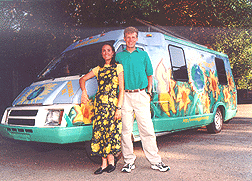Veggie Van
Air Date: Week of May 6, 2005

Kaya and Joshua Tickell in front of their Veggie Van (Courtesy of The Veggie Van Organization)
When Kaya and Joshua Tickell want a fill-up, they drive to the nearest fast food joint and ask for a helping of used vegetable oil, hold the fries. The Tickells take used cooking oil and turn it into clean-burning biodiesel fuel to power what they call their Veggie Van. Producer Bill George caught up with the pair on the road in Sarasota, Florida and has this sound portrait.
Transcript
GELLERMAN: Cellulosic ethanol? It doesn’t exactly roll off the tongue. Uh, fill ‘er up with cellulosic ethanol, okay buddy? Nah. Send us your suggestions to “Name that fuel. E-mail us at comments at loe dot org. That’s comments at loe dot o-r-g. While some folks will soon be filling their tanks with fuels made from flat coke or Budweiser, others are already using alternative fuels made of the oil that cooks their French fries.
WORKER: Hello, welcome to Long John Silvers. Is this going to be for here or to go?
CUSTOMER: It’s going to be to go. We’re with the Veggie Van…
GELLERMAN: Kaya and Josh Tickell power their Veggie Van with clean-burning bio-diesel. They travel the country to promote renewable energy and fill up using used cooking oil from fast food joints along the way. Producer Bill George caught up with the pair in Sarasota, Florida.
[SOUND OF CAR MOTOR]
K. TICKELL: We were really amazed when we started researching this fuel. One thing that we learned is that the original diesel engine was designed by Rudolph Diesel, over 100 years ago to run on vegetable oil. His engine was later modified to run on a dirty byproduct of petroleum, which was called diesel fuel and the idea of running an engine on vegetable oil sort of got lost. So we wanted to take this idea back and help people know this unknown bit of information.
|
J. TICKELL: We spent a lot of time in the laboratory and in the engine compartment of different vehicles, learning about this fuel and making it work. And that became basically our obsession, our passion. K. TICKELL: This is the Veggie Van—the vegetable oil-powered van that’s traveled all around the country powered by vegetable oil from fast food restaurants. We bought the Veggie Van but we didn’t want to put any strange fuel into the engine right away, before we knew it would actually work. So we got a small Volkswagen, a Volkswagen Jetta with a diesel engine and we experimented with various mixtures of this fryer grease fuel in that car until we felt confident enough that it worked. [SOUND OF VAN DOOR SHUTTING] J. TICKELL: Well, here we are inside the Veggie Van. Now this is our little mobile house. It’s kind of like a spaceship. It’s got everything we need to stay alive. K. TICKELL: Everything electrical runs on solar power. So we’ve got the little refrigerator, little TV, couple fans. And you can see the charge controller over there on the wall, pretty much produces enough electricity for us to use anything we want. And even if it’s cloudy for a week, we still have enough electricity because we have batteries under that seat over there, which store the energy. And we’ve got the solar panels mounted on the roof, about 150 watts right now. At different times, we’ll have jugs of fuel in here, up to 100 gallons of fuel in jugs in here. The fuel is not flammable at all. You can throw a match on it and it won’t catch on fire. And it’s not toxic. J. TICKELL: It’s smells like the inside of a fast food restaurant. It really does. [SOUND OF OIL DRIPPING] J. TICKELL: What we do to make the diesel engine run on vegetable oil is we modify the vegetable oil. We make it light and viscous just like diesel fuel is. And we do that by a very simple chemical process. We mix methanol, which is alcohol and lye, which is a white, powdery drain cleaner with the vegetable oil. [SOUND OF BLENDER MIXING] K. TICKELL: It’s actually a very empowering experience to make your own fuel, even if you just make a liter of fuel in a blender. The feeling that you can actually make something to create your own power and not have to be dependent on the oil companies or the gas station to still get from one place to the other. And also the environmental benefits are just fantastic. This fuel is 75 percent cleaner than diesel fuel. So, you really feel like you’re making an impact. J. TICKELL: We get 25 miles to the gallon. [SOUND OF FILLING UP VAN WITH FUEL] J. TICKELL: We’re just filling up the Veggie Van with some bio-diesel, which we made. And I’ve just got a little 12-volt pump here that I hook up to the engine and it just sucks it right out of the jugs and right into the fuel tank. [SOUND OF CAR MOTOR] K. TICKELL: Sometimes we are running low on fuel and we just have to look in the phone book, under restaurants and call up whoever is closest. And we have gotten grease everywhere from the Long John Silvers, Kentucky Fried Chicken chains to the ‘ma and ‘pop burger spot, truck stops--all over the place. And you’d think that, you know, we would get turned down once in a while but actually, we’ve never been turned down. [BEEP, BEEP, HORN HONKS] GELLERMAN: By the way, Daimler Chrysler and General Motors have jumped on the bio-diesel bandwagon. They’re testing blends of the fuel in some of their passenger vehicles in the hope of making engines that will have lower emissions than standard diesels. Links
|






